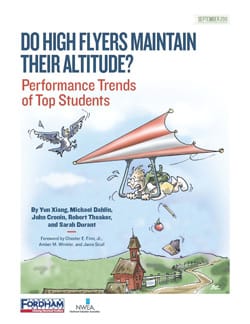There is a student whose needs often go unmet by the schoolhouse and the statehouse—high-achieving, but not quite gifted, one who receives less attention from principals and policymakers focused on bringing the bottom up to proficiency.
 For more on this issue read Fordham's study, Do High Flyers Maintain Their Altitude? Performance Trends of Top Students. |
So a lawmaker in Florida pushed successfully for a law that makes schools focus more attention on students at or near the top.
This week, Florida Governor Rick Scott signed a bill that establishes a minimum number of accelerated learning opportunities while making sure parents and students know how they can take advantage of those options (called Academically Challenging Curriculum to Enhance Learning options, or ACCEL). The measure was championed by state Representative John Legg, who feared that talented students were going through school unchallenged, especially in districts that paid little attention to accelerated learning.
Each of Florida’s sixty-seven school districts largely draft their plans for student progress by stressing expectations for meeting minimum standards, Legg says. Few highlight procedures for enrichment and acceleration. Without being overly prescriptive, Legg’s proposal brings more attention to high-flying opportunities, bringing its own set of uniform standards that serve as a baseline for greater innovation at the school level.
Specifically, the law now says that schools, at a minimum, must offer whole-grade and mid-year promotion for eligible students as well as accelerated learning and early graduation options. Schools also must develop requirements to qualify for those options, because the law also empowers parents to request those opportunities in a way they couldn’t before.
Legg says he wanted a different kind of “parent trigger” for students with IQs that fall short of gifted status but who nonetheless sit bored through their classes. While not the kind of trigger or “choice” in vogue among education reformers, Legg’s effort does establish, for some students, a road map to academic enrichment that Advanced Placement and dual enrollment alone may not satisfy.
The law leaves a lot of room for principals to be innovative. If they care about their best and brightest, they must spend more than the minimum energy required.
